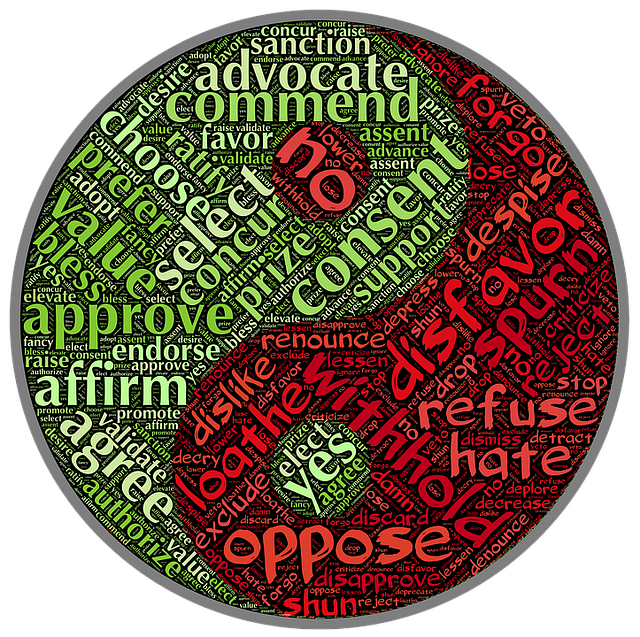In the UK, where a significant proportion of the population speaks languages other than English, translation services play a crucial role in ensuring that patients fully understand their informed consent forms during clinical trials. This is not just a matter of legality but also ethics and patient care, as accurate translations uphold trust and transparency. The process involves specialized translation services with expertise in both medical and legal terminology to provide precise, semantically equivalent translations that comply with regulations like the EU Clinical Trials Regulation (EU) No. 536/2014 and the UK's Medicines for Human Use (Clinical Trials) Regulations 2004. The integration of these services has led to improved patient outcomes and satisfaction, as evidenced by case studies from leading NHS Trusts, demonstrating the importance of high-quality translation in healthcare settings within the UK. Keywords: Translation services for Informed Consent Forms UK.
Navigating the complexities of healthcare and ensuring ethical practices is paramount, especially in a multicultural society like the United Kingdom. A critical aspect of this endeavour is the provision of informed consent forms that patients can understand fully. This article delves into the nuances of obtaining certified informed consent translations, highlighting the indispensable role of professional translation services in upholding healthcare compliance. We explore the legal framework, key considerations, and best practices for translating informed consent forms within the UK’s healthcare system, ensuring that patients from diverse linguistic backgrounds receive clear, accurate, and certifiable information. A comprehensive guide on selecting the right service provider and a case study showcasing successful translation projects will provide valuable insights for medical professionals and institutions alike.
- Understanding the Importance of Certified Informed Consent Translations
- The Role of Translation Services in Healthcare Compliance
- Navigating Language Barriers: Informed Consent in a Multicultural UK
- Key Considerations for Informed Consent Form Translation
- Choosing the Right Translation Service Provider for ICFs in the UK
- The Legal Framework Governing Informed Consent in the UK
- Best Practices for Translating and Certifying Informed Consent Forms
- Case Study: Successful Informed Consent Translation Project in the UK Healthcare System
Understanding the Importance of Certified Informed Consent Translations

Navigating the complexities of healthcare, particularly when it involves patients who are non-native speakers, underscores the necessity for clear and accurate communication. Certified informed consent translations play a pivotal role in this context. These translations ensure that patients fully comprehend the medical procedures, potential risks, benefits, and alternatives involved in their care. In the UK, where diversity is the norm, translation services for informed consent forms are not just a courtesy but a legal requirement to adhere to ethical standards and compliance with regulations such as the EU’s MEDDEV 2.7.1 and the General Data Protection Regulation (GDPR). Utilizing specialized translation services for informed consent forms in the UK safeguards patient autonomy, fosters trust between patients and healthcare providers, and mitigates the risk of miscommunication that could lead to adverse outcomes or legal complications. It is a critical component of providing culturally responsive care and upholding the integrity of the healthcare system.
The Role of Translation Services in Healthcare Compliance

Navigating Language Barriers: Informed Consent in a Multicultural UK

Navigating language barriers is a critical aspect of healthcare delivery, particularly in the culturally diverse context of the United Kingdom. In a multicultural UK, patients from varied linguistic backgrounds require access to health information in their preferred or native languages. This is where translation services for Informed Consent Forms (ICFs) become indispensable. These forms are legally mandated documents that outline the nature of a proposed medical intervention, potential risks, benefits, and alternatives, ensuring patients make informed decisions about their care. The translation process must be accurate and culturally sensitive to maintain the integrity of the information and uphold patient trust. Professional translation services specializing in healthcare communications can bridge this gap, providing interpretations that convey not only the literal meaning but also the subtleties and nuances inherent in medical terminology. This is crucial for maintaining high standards of care and compliance with regulations such as the General Data Protection Regulation (GDPR) and the Equality Act 2010, which advocate for equality and fairness in healthcare provision, ensuring that every patient understands their rights and the nature of the procedures they consent to undergo. By leveraging certified translation services for Informed Consent Forms in the UK, healthcare providers can effectively communicate with patients who are not native English speakers, fostering a more inclusive and equitable healthcare system.
Key Considerations for Informed Consent Form Translation

When navigating the complexities of informed consent form translation, it is paramount to engage with specialized translation services that understand the nuances of legal documentation and the specific requirements within the UK. The process of translating informed consent forms requires not only linguistic precision but also cultural sensitivity and a deep understanding of medical terminology. Translation services for Informed Consent Forms UK must be adept at conveying ethical considerations, potential risks, benefits, and alternative options in a manner that is both accurate and comprehensible to the target audience. This ensures that participants provide consent voluntarily, with a clear understanding of what they are agreeing to.
To effectively translate informed consent forms for use in the UK, translators must be certified and possess expertise in both the source and target languages. They should also be familiar with the ethical standards governing clinical research within the UK’s regulatory framework. A thorough review process is essential to confirm that all scientific and medical terms are correctly translated and that the form maintains its original intent. Additionally, translation services should include forward translation, back-translation, and a comparison of both to ensure equivalence in meaning. This meticulous approach not only safeguards the rights of research participants but also upholds the integrity of the clinical study as a whole.
Choosing the Right Translation Service Provider for ICFs in the UK

When embarking on the quest for certified informed consent translations in the UK, selecting a reliable and competent translation service provider is paramount. The process of translating Informed Consent Forms (ICFs) requires not only linguistic expertise but also an understanding of medical terminology and ethical considerations. It is crucial to opt for translation services that specialize in both healthcare documentation and the specific languages required, ensuring that the translated forms adhere to both legal standards and the nuances of patient communication. In the UK, where multilingualism is prevalent, finding a provider with a proven track record in the healthcare sector becomes even more essential. Look for translation services that are accredited by relevant bodies such as the Association of Translation Companies (ATC) or the Institute of Translation and Interpreting (ITI). These certifications guarantee that the translators have the necessary qualifications and expertise to handle sensitive and critical documents like ICFs. Additionally, ensure that the service provider can offer certified translations, which are legally recognized and stamped with a signature or seal as required by UK regulations. This due diligence will safeguard your organization’s compliance with ethical standards and legal requirements, thus protecting both the rights of research participants and the integrity of the study. With the right translation service provider, you can navigate the complexities of informed consent across languages with confidence, ensuring that all participants fully understand their role in a study and consent to participate without any language barriers.
The Legal Framework Governing Informed Consent in the UK

Navigating the legal framework governing informed consent in the UK necessitates a comprehensive understanding of both national legislation and ethical guidelines. The primary statutory instrument is the European Union’s Clinical Trials Regulation (EU) No. 536/2014, which harmonises the processes across EU member states, including the UK post-Brexit due to its retention of these regulations. In the UK, the Medicines for Human Use (Clinical Trials) Regulations 2004, as amended, provide a robust framework for clinical trials, mandating that informed consent forms be made available in a language and format that trial participants can understand. Translation services for informed consent forms in the UK must therefore be precise and accurate to comply with these regulations, ensuring that potential risks, benefits, and alternative treatments are clearly communicated across linguistic barriers. Professionals specialising in translation services for informed consent forms in the UK are integral to this process, offering culturally and contextually appropriate translations that uphold ethical standards and legal obligations. This is crucial for maintaining patient trust and ensuring informed consent is truly informed, regardless of a participant’s language proficiency.
Best Practices for Translating and Certifying Informed Consent Forms

When embarking on the translation and certification of informed consent forms, it is imperative to adhere to stringent best practices to ensure clarity, accuracy, and legal compliance. Translation services for Informed Consent Forms in the UK must navigate the complexities of medical terminology and legal language, which often differ across languages and jurisdictions. To begin, translators should utilise professionals who are not only linguistically proficient but also medically informed to handle the nuances of medical consent. This dual expertise is crucial for conveying the subtleties and complexities inherent in such documents. The translated text must be equivalent in meaning and comprehension to the original, ensuring that participants fully understand their rights and the nature of the clinical research they are entering.
Furthermore, the certified aspect of these translations is a critical step to ensure legal validity. UK regulations stipulate that such translations must be verified by a certified translator or a relevant authority within the UK. This verification process often includes a certification statement and, in some cases, an official stamp or seal. It is advisable to engage with translation services that have a proven track record of working with informed consent forms and are familiar with the specific requirements of the Medicines and Healthcare products Regulatory Agency (MHRA) or other relevant bodies. This guarantees that the final document not only communicates effectively across languages but also meets all legal and ethical standards required in the UK, ensuring the integrity and validity of informed consent in a multilingual context.
Case Study: Successful Informed Consent Translation Project in the UK Healthcare System

In the UK healthcare system, the implementation of translation services for informed consent forms has been pivotal in bridging language barriers and ensuring ethical standards are upheld. A case study that exemplifies this is a project undertaken by a leading NHS Trust, where the challenge was to provide clear and accurate translations of informed consent documents for patients who do not speak English as their first language. The project’s success hinged on a meticulous approach that combined expertise in medical terminology with linguistic precision. By leveraging professional translation services specialising in informed consent form translations, the NHS Trust was able to deliver versions of these critical documents in over 15 languages, ensuring patients fully understood their treatment options and associated risks. This initiative not only adhered to legal requirements but also fostered trust and transparency within multicultural communities, ultimately enhancing patient care and outcomes.
The translation process involved a two-step approach: firstly, translators with medical expertise translated the content into the target language, and secondly, native speakers in healthcare reviewed these translations for cultural relevance and clarity. This ensured that the informed consent forms were not only linguistically accurate but also contextually appropriate. The project’s success was measured by patient feedback, which indicated a significant increase in comprehension and satisfaction with their medical care. Moreover, the project demonstrated that with the right combination of expertise and diligence, translation services for informed consent forms in the UK can be both effective and essential for inclusivity within the healthcare system.
In conclusion, the necessity of certified informed consent translations within the UK’s multicultural healthcare system cannot be overstated. Ensuring that patients fully understand their treatment options and associated risks is paramount to informed consent. Translation services for informed consent forms in the UK play a critical role in meeting this need, bridging language gaps and upholding legal standards of patient care. By adhering to best practices and selecting reputable translation service providers, healthcare providers can offer clear, accurate, and certified translations that respect patient autonomy and compliance with regulations. The successful case study highlighted in this article underscores the effectiveness of such translations in facilitating ethical healthcare decisions across diverse linguistic communities. It is a testament to the indispensable role these services play in the UK’s healthcare landscape, ensuring every individual receives information that is both understandable and compliant with legal frameworks.



